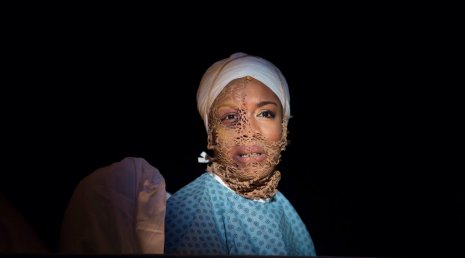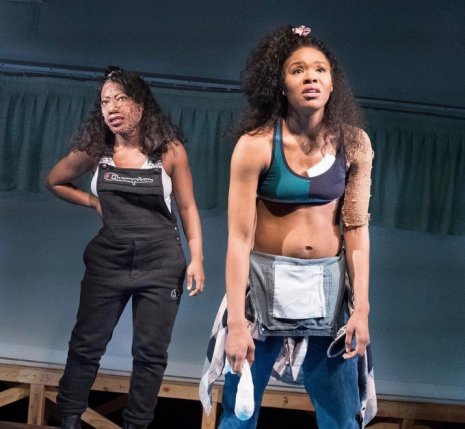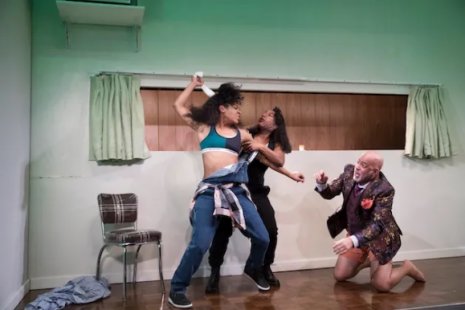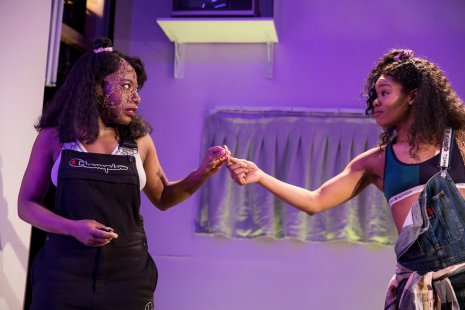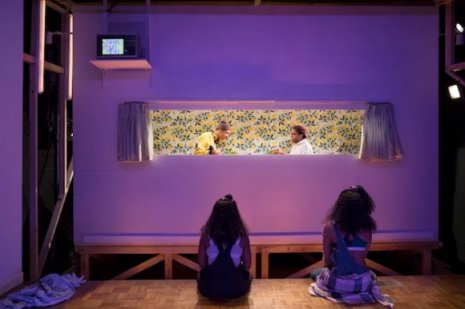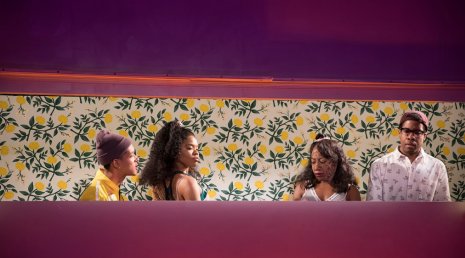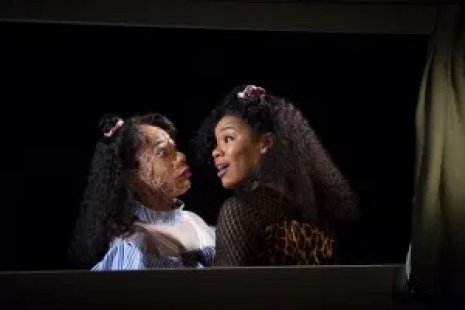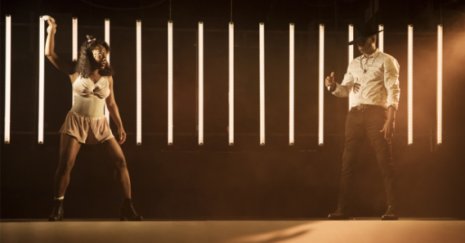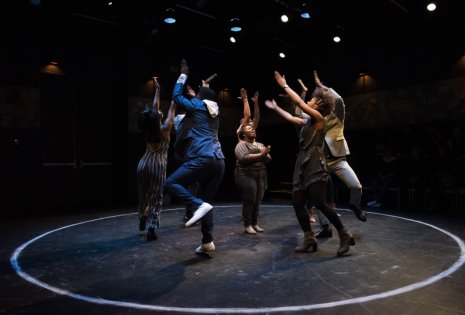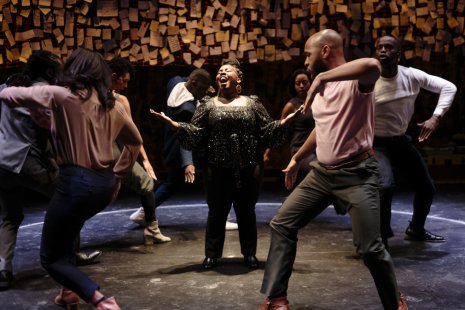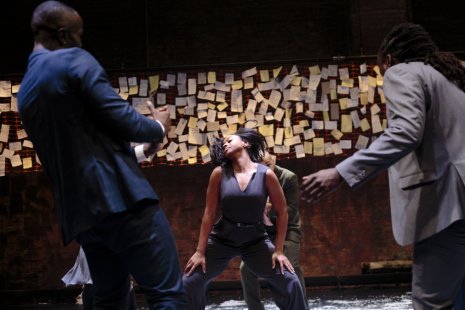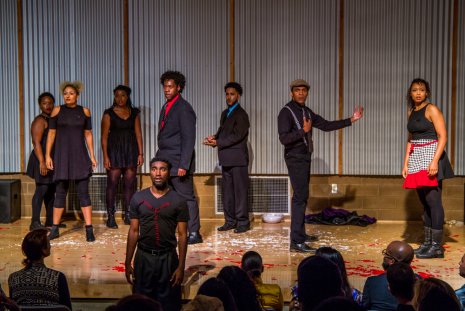In Aleshea's Words...
My theatre making practice is rooted in a desire to engage difficult questions, upend that which is problematically normalized and present Blackness in unexpected ways. I try to do this by creating landscapes occupied by figures that surprise me with their strategies for getting out of the trouble I place them in.
Recent works which accomplish these goals include:
IS GOD IS
As a prompt, I asked myself what a play that takes its cues from ancient Greek tragedy filtered through my sensibilities and interests could look like. What I found was a tale that made use of the liberated politics and aesthetics of the Afropunk Movement, hip-hop’s rhythms and Spaghetti Western tropes. IS GOD IS tells the story of twin sisters on an epic revenge quest from the south to California. In addition to the redemption the sisters seek inside of the story, I use the play to activate a reckoning with the stifling respectability politics Black girls and women are subject to. Thus, the women are boisterous, unflinchingly violent and unrepentantly vengeful.
I just wanna
I’ve earned it
I planned for months
IF He comes home and I tell Him the
car’s been stolen do you know do you know what He’ll…
goddammit Angie you really thought you’d get away, didn’t you you really thought you really did—
your weak, ghetto trashy “mama” got burned up!
She should’ve left Him!
“Ghetto trashy”?
r.
You want them pearls?
WHAT TO SEND UP WHEN IT GOES DOWN
When Trayvon Martin’s killer was acquitted of all charges, I felt a strong compulsion to write something that was useful, compelling, viscerally engaged with the issue at hand and as radically absurd in its content and structure as the normalization of anti-blackness is in this country. WHAT TO SEND UP... is a ritual that privileges the feelings of Black people with regard to the devastating trauma of anti-blackness. The piece offers viewers an active way to honor those lost to racialized violence while making space for healing, release and affirmation.
You lookin at me like “whoa”
Like “whoa” Like “what” Like “whoa”
What
What
What
When so many words are fighting their way out of my mouth
that it foams
You and you don’t want to listen to the words themselves
preferring, instead, to ponder the foam’s density and viscosity like,
“Where did it come from? Why she so mad?”
Well, I just don’t know.
I guess there was a sale on Mad down at the Mad Store
So I went down and bought me some Mad
And, here it is.
Meanwhile, I and I can’t find myself in the mirror, in the reflection of the screen
unless of course I am biting myself
You and you approve of the biting of the self
especially when it is a self that looks like me
You love it, O, you love it when I bite myself
because that is the kind of Black story you like.
When I am heavy and downtrodden
with biting myself
when I wear the flavor of Blackness you like
When it is warm and fuzzy Blackness that does not creep under your bedroom door at night
Blackness that doesn’t disrupt brunch or make you question
the things your privilege steals and steals from me
O, you love it
You wield your pen
I blubber most Blackly
You nod your head, you know this story
I weep, I moan, I reach for you from down below
You love it
You wield your pen most bravely
You are afraid to come to my neighborhood
You would never help my aunt with her groceries
You do not see me coming
but you come see my story
You sit in your soft chair
You review me and you do not feel the foolishness of it
You feel no shame
You really think you are in charge
I’d be embarrassed for you if I weren’t so busy fighting for my life
If I were to turn my teeth toward you
If I were to turn my teeth toward you
You and you would not know what to do and do
Do you do you
Do you remember when I tried to love you?
Do you remember when I tried to love you?
It was like riding a bike without a chain.
ON SUGARLAND
I had not known, when someone approached me to adapt Sophocles’ PHILOCTETES, about the ways Black veterans have been historically targeted by white violence. I hadn’t known about Charles Lewis, lynched in his uniform, or Joe Nathan Roberts, home on a G.I. Bill when white men (angry he hadn’t called them “sir”) abducted and murdered him. Armed with this knowledge of the targeted lynching of Black veterans and my personal experiences as a military child, my focus shifted from wanting to write a faithful adaptation of PHILOCTETES to creating a new story that engaged the major themes of the original myth while making space for my own questions and impulses.
where the end of Tiparoo Lane becomes a mouth
a man inside the mouth cannot stop bleeding and bleeding.
He done tried applying pressure
He done tried staunching the wound with words of magic
He done cursed and railed and begged
and still his foot seeps steady
more blood than he thought he had inside him
comin in currents
so scarlet iss damn near black
a trail of me behind me
unless I go down with it Ha
Gods Ha
O you Gods Ha
What must Staff Sergeant Saul Greenwood look like from Gods eye view?
Do he got a warrior’s stroll? Ha ha
Do he got a cloud around his head Do he got a mind or is it slipping out like sand?
Doctor say iss the pills but I ‘on know
I on’ know, Gods.
Is you the ones dangling memories quick and sharp
like blinking
quick and sharp like poof
Gods?
At this juncture, I recognize the danger in becoming merely reactive to our socio-political climate. I worry about an internalized critical voice urging me to reflexive (rather than deeply considered and reflective) art-making. To combat this, I’m seeking new ways to be adventurous and truthful.
With a new play, FEAST OF RABBITS, I use the frontier narrative to tell the story of a respected family in a small town. The play is giving me the opportunity to use familiar tropes to problematize presumption of characters’ goodness. It’s also giving me a chance to think even more expansively about how to present Black bodies onstage. How might Blackness be presenced in a story that seems to center white characters?
The tone of the play is one of deranged frivolity, the figures smiling and seething all at once. How might such a thing be performed? How might a metatheatrical frame signal the audience’s complicity in upholding colonial ideals? These queries signal a deepening of ideas I’ve wrestled with for years. I intend to entertain these provoking questions as I explore FEAST OF RABBITS and other works:
My work doesn’t shrink from discomfort.
With WHAT TO SEND UP WHEN IT GOES DOWN, for example, the prompts allowing audience to self identify as survivors of and/or witnesses to anti-blackness create an atmosphere of unease precisely because it gives anti-blackness no place to hide. I don’t believe it is possible to challenge a problem as pervasive, as deeply- entrenched as white supremacy in real time without making those present (including myself) nervous.
My work doesn’t shrink from violence.
And I hope it comes across that the violence isn’t a proposition for real-world violence. Rather, it’s an invitation to myself, readers and audiences to imagine the figures committing the violence differently, expansively. Sadie’s story at the beginning of ON SUGARLAND, for example, is about scorching psychic earth rather than actually riddling bodies with bullets.
My work is physically demanding by design.
I feel strongly that there is no spectacle quite like that of a human body engaging in vigorous physical activity. Physical intensity often serves to underscore whatever spiritual/psychological challenges characters are enduring in the narrative. The ensemble in WHAT TO SEND UP...must increase their speed and intensity, building toward an explosive release. The lively chorus in ON SUGARLAND which dwindles as the piece progresses is a visual embodiment of the community's losses…


